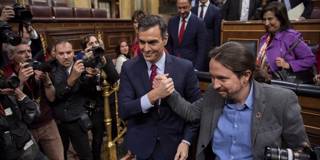Spain's new coalition government will face significant challenges as it tries to reconcile a left-wing agenda with the need for fiscal sustainability. It will also have to confront the "Catalan question" and other sources of political polarization – and all with a razor-thin majority.
BARCELONA – After enduring two general elections in 2019, Spain now has its first coalition government since the death of Generalísimo Francisco Franco. Led by Prime Minister Pedro Sánchez of the Socialists and Pablo Iglesias of the radical left Podemos, the coalition was forged with the explicit support of the Basque Nationalist Party (PNV), and with a crucial negotiated abstention on the part of the pro-independence Republican Left of Catalonia (ERC). Following an extremely close parliamentary vote – with 167 yeas, 165 nays, and 18 abstentions – the coalition will face fierce opposition from the right-wing People’s Party (PP) and a now-diminished Ciudadanos, as well as Vox, a rising far-right party.

BARCELONA – After enduring two general elections in 2019, Spain now has its first coalition government since the death of Generalísimo Francisco Franco. Led by Prime Minister Pedro Sánchez of the Socialists and Pablo Iglesias of the radical left Podemos, the coalition was forged with the explicit support of the Basque Nationalist Party (PNV), and with a crucial negotiated abstention on the part of the pro-independence Republican Left of Catalonia (ERC). Following an extremely close parliamentary vote – with 167 yeas, 165 nays, and 18 abstentions – the coalition will face fierce opposition from the right-wing People’s Party (PP) and a now-diminished Ciudadanos, as well as Vox, a rising far-right party.